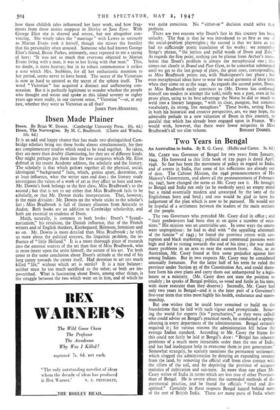Ibsen Made Plainer
IT is an odd and happy chance that has made two distinguished Cam- bridge scholars bring out these books almost simultaneously, for they are complementary studies which need to be read together. So taken, they are more than doubly illuminating, for they are of different kinds. One might perhaps put them into the two categories which Mr. Eliot defined in his recent Academy address, the scholarly and the literary. The scholarly is that which gathers together all the physical, social, ideological " background " facts, which, genius apart, determine, or at least influence, what the writer says,and does ; the literary study investigates the values of a work of art as they affect us here and now. Mr. Downs's book belongs to the first class, Miss Bradbrook's to the second ; but that is not to say either that Miss Bradbrook fails to be scholarly, or that Mr. Downs shirks interpretation. That, however, is the main division: Mr. Downs on the whole sticks to the scholar's last • Miss Bradbrook is full of literary allusions from Aristotle to Auden. Both books are an addition to Cambridge scholarship, and both are essential to students of Ibsen.
Much, naturally, is common to both books : Ibsen's " Scandi- navianism," his revulsion, the Danish influence, that of the French writers and of English thinkers, Kierkegaard, Bjornson, feminism and so on. Mr. Downs is more detailed than Miss Bradbrook ; he tells us more about the political stresses, the linguistic problem, the in- fluence of " little Holland." It is a more thorough piece of research into the external sources of the art than that of Miss Bradbrook, who is more intent upon the artist himself, the nature of his art. Yet both come to the same conclusion about Ibsen's attitude at the end of his long career towards the career itself. Had devotion to art too much killed "life," without which art is sterile? It is a nice balance: neither must be too much sacrificed to the other, or both are im- poverished. What is fascinating about Ibsen, among other things, is the struggle between the two which went on in him, and of which he was quite conscious. No " either-or " decision could solve that problem.
There are two reasons why Ibsen's fate in this country has been unlucky. The first is that he was introduced to us first as one of the social-problem playwrights ; the second is that we have as yet had no sufficiently poetic translation of his works : we remember Synge's phrase, " the joyless and pallid words of Ibsen and Zola." As regards the first point, nothing can be plainer from Archer's trans- lation that Ibsen's problem is always the metaphysical one ; this comes out clearly in Brand and Peer Gynt, to be somewhat submerged until we get to the last group of plays, the great ones, corresponding, as Miss Bradbrook points out, with Shakespeare's last phase ; but even metaphysical ideas have to wear the social garments of their time
when they come on to stage. As regards the second point, Ibsen, as Miss Bradbrook easily convinces us (Mr. Downs has confessed himself too modest to attempt the task), really was a poet, even in his prose plays, using to its best advantage the Norse he did so much to weld into a literary language, "with its clear, pungent, but concrete vocabulary, its strong, live metaphors." These books, setting Ibsen in both his historical and creative perspective, are, we may hope, the admirable prelude to a new valuation of Ibsen in this country, to parallel that which has already been engaged upon in France. We would wish, however, that there were fewer misprints in Miss


































 Previous page
Previous page